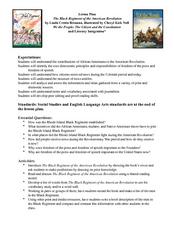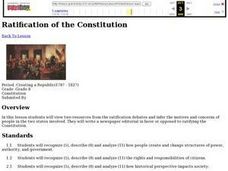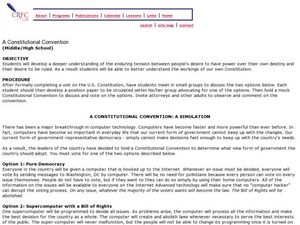Judicial Learning Center
The U.S. Supreme Court
How do Supreme Court justices determine which cases to consider? What happens when the Supreme Court decides not to take a case? The lesson explores important questions and others in the field of criminology. It focuses on the...
National Endowment for the Humanities
George Washington: The Precedent President
Everyone knows that George Washington was the first president, but do your scholars know why that was so important? The lesson plan, the third in a sequence of three, allows learners to understand how George Washington set a precedent...
Pacific University Oregon
Civil Rights: US History
To gain an understanding of the Civil Rights Movement of the 1960s, class members investigate the Jim Crow Laws, the Emancipation Proclamation, the 13th, 14th, and 15th Amendments of the US Constitution, and the 1898 Supreme Court case,...
New York State Education Department
US History and Government Examination: January 2018
It's time to test those skills! Assess pupils' knowledge of US history and government with short answer questions, multiple-choice items, and essays. The resource serves as a standardized test that functions well for a final exam....
Curated OER
We the People: The Citizen and the Constitution: The American Revolution
The contributions of African-Americans to the American Revolution are the focus of this Social Studies and language arts lesson. After reading and discussing Linda Crotta Brennan’s The Black Regiment of the American Revolution, class...
Judicial Learning Center
Article III WebQuest
Why is Article III of the constitution so significant? Pupils discover the importance of Article III and how it relates to past as well as current events by completing Internet research using a provided handout. They learn everything...
Museum of the American Revolution
Hamilton Was Here: Rising Up in Revolutionary Philadelphia
Hamilton may be a hit Broadway show, but there is so much more to learn. An eight-unit resource guides young historians through the life of Alexander Hamilton and the Revolutionary War. The lessons include hands-on-activities, writing,...
Curated OER
US Constitution And Amendments
Students become familiar with the US Constitution and consider how it affects their lives. They research the Preamble to articulate the purposes of government, compile collages, and research the separation of powers within each branch of...
Curated OER
Ratification of the Constitution
Eighth graders view two resources from the ratification debates and infer the motives and concerns of people in the two states involved. They write a newspaper editorial in favor or opposed to ratifying the Constitution.
Curated OER
Abraham Lincoln and the U.S. Constitution
Learners investigate President Abraham Lincoln's use of the U.S. Constitution and its importance to the Civil War. For this US history lesson, students read text about President Lincoln and the US Constitution. Learners examine the...
Curated OER
Constitution Evolution Research Project
Eighth graders demonstrate how South Carolina's Constitution has evolved through a research report. In groups, 8th graders conduct research and write a paper analyzing the historical and social influences that have been associated with...
Curated OER
Constitution Week
Students prepare one-minute broadcasts about events leading to the writing of the Constitution and current issues in the next election. Students read their broadcasts on the school P.A. system each morning during Constitution Week.
Curated OER
A CONSTITUTIONAL CONVENTION: A SIMULATION
Students discuss two computerized options to change the current U.S. government. In this Constitutional Convention lesson, students write a statement advocating for one of the choices and participate in a mock modern Constitutional...
Curated OER
The Constitution and The Bill of Rights
Students explore the Constitution and The Bill of Rights including the process of the Convention throgh a variety of websites that examine the framers, venets leading up to and after the convention games and more.
Curated OER
We the People... What Conflicting Opinions Did the Framers Have about the Completed Constitution?
Students study some of the disagreements about the Constitution which set the stage for the debates over its ratification. These are significant because many have to do with issues that are still discussed and debated today.
Curated OER
Conflicting Ideas about the Completed Constitution
Students analyze and discuss the opinions about the US Constitution as given by Benjamin Franklin and George Mason.
Curated OER
The Constitution
Students determine that the rules that we follow in America were written in the Constitution. They study a copy of the constitution and discuss how it compares and differentiates from the plan the class has written. They recite our...
Curated OER
Foundations of the U.S. Constitution
Eighth graders use information found in their textbooks to create flip charts containing information about Articles of Confederation, U.S. Constitution and Bill of Rights, English Bill of Rights, House of Burgesses, Magna Carta, and...
Curated OER
Revising The Constitution
Student review the Constitution using Dataviewer. Students discuss each Amendment in the Bill off rights and what each one means to individuals and their freedoms. Students break into groups and brainstorm about Amendments they think...
Curated OER
Democratic Ideas of the 1776 Maryland Constitution
Students analyze primary source documents. They evaluate how well the requirements for voting and holding office in the 1776 Maryland Constitution reflect democratic values.
Curated OER
Should the United States Have a Central Bank?
Students assess the validity of a national bank. They study the importance of McCullough v. Maryland. They review the arguments of Hamilton and Jefferson. They analyze the Tenth Amendment and the debate over state v. federal power. They ...
Curated OER
The Bill of Rights
Seventh graders determine why the Bill of Rights was added to the Constitution. For this U.S. government lesson, 7th graders discuss the first 10 amendments and any vocabulary they may be unfamiliar with. Students then read different...
Curated OER
Democracy: An Introduction.
Learners study the U.S. Constitutional System and how it compares with forms of democracy that developed in ancient Greece and Rome. They list and explain the requirements it takes to form a society to be considered a nation.
Curated OER
History Biographies
Students explore the life and the contributions of five people from U.S. history in the five lessons of this unit. james Madison, Dolly Madison, Sequoyah, Harriet Tubman, and Clara Barton are presented to students for exploration and...

























